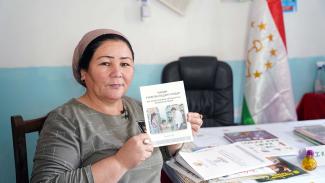In the district of Qubodiyon in the Khatlon region of Tajikistan, Uzbek is the predominant language. However, five-years ago, some schools in this area began to teach students in Tajik, the national language. Transitioning to a new language is challenging for students and the lack of Tajik reading materials makes it difficult for teachers to teach in a language they do not normally speak.
The nine teachers at School #32, who all speak Uzbek, are among those with these struggles. Most of their 181 students were introduced to Tajik for the first time upon entering the school. Teachers and parents agree that if students had access to Tajik language preschool or kindergarten, the transition would be easier, however, pre-k education is not widely accessible. The Ministry of Education and Science also plans to train teachers who need Tajik-language support, but they are yet to provide this service.
In August 2020, the USAID Read with Me project delivered over 200 children’s books to the students at School #32, aged between 6 and 9 years old. This brought relief to the teachers and joy to the children, who not only read these books as part of their lessons but also take the initiative to visit the library where they read the books in their spare time.
“The children enjoy the big letters in the books and they like to read them with each other,” says Adolat Qambarova, a teacher at School #32. “Now children know the authors of these books and after reading them, they organize debates and create question sessions with each other.”
School librarian Dilnoza Juraeva has noticed many changes in the students’ approach to books in the library. “Every day the children read these books and their interest grows.” Teachers are now creating classes that use the books as learning materials, bringing more joy to the children. Students are eager to share their favorite books and take turns reciting passages in class.
“...It helps me to read books. There are fairy tales, stories, and poems. I like to read books and memorize poems. That is why we like these books,” says second-grader Usmon Toshtemirov.
Children are not the only ones to benefit. Teachers have found that reading the chapter books during their breaks also improves their own Tajik language skills, equipping them to teach the language better.
“Books open this world… They really help not only our children but also teachers who are learning as well,” says Uralova Matluba, a teacher at School #32.
The availability of USAID-provided books combined with parental involvement has made a positive and inspiring effect on students. Students are now creatively writing their own stories knowing that the books were written by Tajik authors.
“We study and read books together. Our children bring home books from the library, and they read them several times. They even memorize them,” says Khushmatova Ruzigul, a parent of three children at School #32.
The USAID Read with Me activity collaborated with the Ministry of Education and Science to create these engaging, age-appropriate books that were written, illustrated, printed, and bound in Tajikistan. The books have been distributed nationwide to primary students, reaching more than 80 percent of schools. By the end of the activity in 2021, USAID will distribute over 1.3 million books to more than 3,000 schools across Tajikistan.

